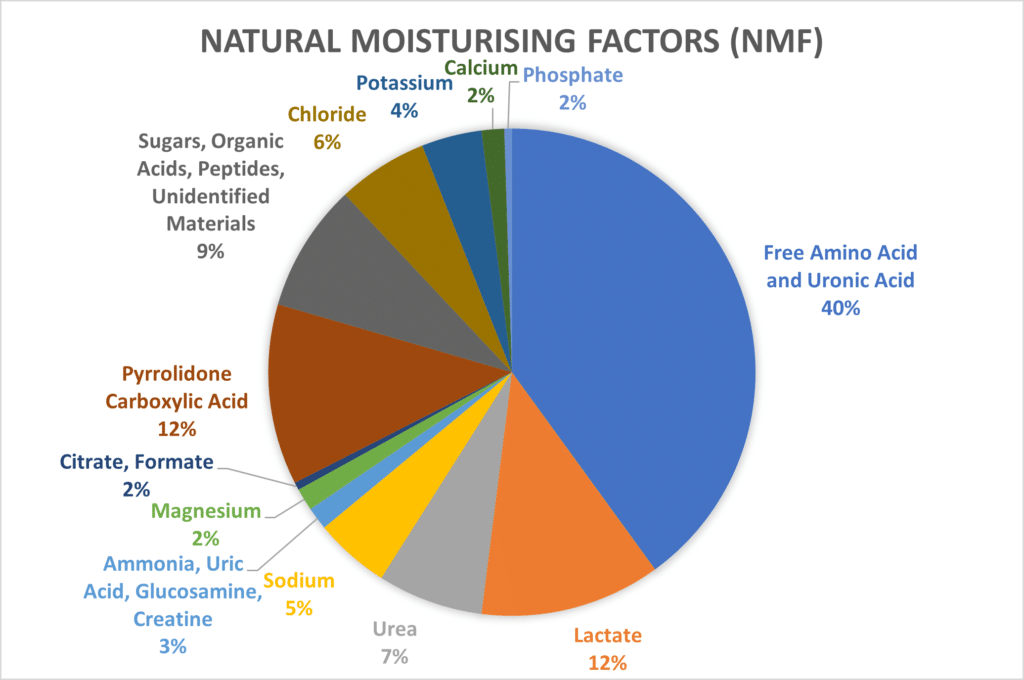Beat Psoriasis and Dermatitis by Going Back to Basics
Psoriasis and atopic dermatitis are challenging conditions to manage however they can be brought under control by going back to the basics and addressing underlying imbalances in the chemical integrity of the skin.
In the same way our bodies need the right balance of vitamins, minerals, proteins, carbohydrates and other nutrients to function at its best, our skin also needs the correct balance of compounds to retain moisture and remain healthy. When this balance is destabilised, diseases such as psoriasis and dermatitis are the itchy and uncomfortable result.
Since the 1950s independent scientists and dermatologists have agreed there are a set group of amino acids, salts, minerals and water-soluble compounds (sometimes called humectants), that, when present in the skin in the right balance, ensure the skin retains optimal moisture and is free from detrimental skin conditions.
These collective compounds are referred to as Natural Moisturising Factors (NMF) and skin specialists have long known that ensuring the NMF is correctly balanced is key to treating the scourge of psoriasis and dermatitis.
Several studies have shown that people suffering psoriasis and dermatitis have very low levels of certain NMF compounds in the Stratum Corneum (top outer layer) of the skin. When correct treatment is given and levels are brought back to the optimal range, the health of skin has been shown to greatly improve.
What are the Natural Moisturising Factors?
Several widely-acknowledged studies have identified each Natural Moisturising Factor – the key compounds necessary for maintaining peak skin health – as well as their optimal ratio. The following graph illustrates the ideal NMF recipe:

In the same way some people may be low in iron, calcium or some other vitamin or mineral, the trick for dermatologists, when presented with an individual case of psoriasis or dermatitis, is to identify what specific NMF ingredient is in short supply.
However, it’s known that high concentrations of some NMF compounds can be very detrimental for the skin so it’s important to have a doctor or dermatologist determine which NMFs are lacking before and treatment program can begin.
Once the patient’s skin needs have been assessed, a specialist compounding pharmacist from National Custom Compounding can make up a range of topical and oral solutions to deliver the right NMF compounds, in the correct percentages, to the skin via the most efficient delivery system.
Some of the most common NMF compounds routinely identified as being deficient in the skin of psoriasis and dermatitis sufferers include the following:
Urea
If you’re thinking urea is something found in urine, you would be correct, however the nitrogenous compound also plays an important role in retaining moisture in the skin. Researchers aren’t entirely certain of the mechanism behind its moisture-retaining properties, however numerous studies have shown urea’s efficacy in treating conditions associated with dry skin.
In one study, over 1600 patients suffering either psoriasis, dermatitis or eczema applied a lotion containing higher than normal concentrations of urea, as well as polidocanol, to affected areas of skin over several weeks.
At the end of the observation period 90% of both the doctors and the patients rated skin condition and reduction of itching as ‘good’ or ‘very good’.
Lactic Acid and Potassium
People suffering from seasonally influenced (winter time) dry skin have been found to have very low levels of Lactic Acid and Potassium in their NMF balance. A study published in the Journal of Investigative Dermatology has found that when healthy levels of Lactic Acid and Potassium are re-introduced to the skin, hydration levels are greatly improved and the symptoms or dry skin, psoriasis and dermatitis diminish.
Pyrrolidone Carboxylic Acid (PCA)
PCA is the second most predominant ingredient in the NMF and independent studies have shown that skin creams and ointments containing at least 2% PCA help retain moisture and reduce the symptoms of dry skin.
Amino Acids and Uronic Acid
After water, amino acids are the second largest component in our bodies (20%), so it’s no surprise that amino acids also feature heavily in the make-up of healthy skin. A poor diet, stress, infections, hereditary factors and toxins in the environment may lead to low levels of amino acids in the body as well as the skin.
A study published in the Journal of Clinical Biochemistry and Nutrition found that the skin texture of a study group taking amino acid supplements over six weeks markedly improved when compared to a control group.
Glucosamine
In a study published in the Scandinavian Journal of Immunology, glucosamine was shown to improve the symptoms of atopic dermatitis in mice. Dermatitis in mice is clinically similar to the same condition in humans. Other peer-reviewed studies have shown glucosamine to be effective in healing skin wounds and improving skin hydration.
With a script from your doctor or dermatologist, National Custom Compounding can make up an oral or topical remedy to treat the underlying cause of psoriasis and dermatitis by improving your levels of NMF.
Talk to your doctor or dermatologist and ask if a script for compounded skin treatment might be suitable for you.
For more information on tailor-made medicine formulated specifically for your health needs, contact one of the friendly staff at National Custom Compounding on 1300 731 755 or send an email to [email protected].
